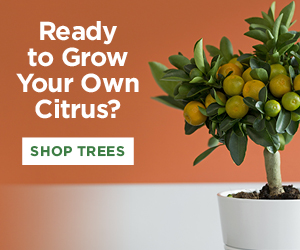
Have you ever wished you could make fresh-squeezed orange juice from oranges you grew yourself? Or that you could enjoy fragrant lemon trees that produced fruit you could add to your favorite recipes and drinks? You may have thought it wasn’t in the cards for you because you don’t live in a climate that supports growing citrus trees. Well, take heart – buying a dwarf citrus tree can change all that!
Dwarf citrus trees include the many varieties of citrus that are grown using dwarf rootstock. This process creates trees that reach sizes of between six and twelve feet tall. A dwarf citrus tree will produce normal-sized fruit for its variety, and can be grown either in the ground, or in a suitable container. By keeping dwarf citrus trees in containers, you can move them indoors when the weather gets cold.
Read on to learn more about five dwarf citrus trees you didn’t know could be grown indoors!
- Dwarf Lemon Trees. If you’ve never grown a fruit tree indoors, your best bet is to buy dwarf lemon tree varieties to start with. You really can’t go wrong with a Dwarf Improved Meyer Lemon Tree from Citrus.com…this variety is one of the easiest indoor lemon trees to grow, and the dwarf Meyer lemon tree size tops out to less than six feet tall depending on the size of the pot you keep it in. Plus, the fruit is tasty and very versatile…Meyer lemons (which can be difficult if not impossible to find in some stores) are a hybrid of a true lemon and a mandarin orange, so the fruit is rounder than a true lemon and sweet as well as tangy. Meyer Lemons make excellent lemonade, and are great in recipes and cocktails, too.
- Dwarf Lime Trees. Growing an indoor lime tree is easier than you think! There are several popular varieties. If you choose to keep a Dwarf Bearss Lime Tree in container, you’ll be able to grow traditional, “true” limes such as you’d find in local grocery stores. Another option is a to grow a Dwarf Key Lime Tree. Key lime trees produce those lovely, sweet little limes that give the famous pie its name.
- Dwarf Mandarin/Tangerine Trees. If you’re a fan of fresh-squeezed orange juice, you’ll definitely want to get a Dwarf Orange Tree or variety of a variety of Dwarf Mandarin Tree! If you think you’d like a Dwarf Tangerine Tree (tangerines and satsuma are varieties of mandarin), Brown Select Satsuma and Owari Satsuma dwarf trees from Citrus.com produce fruit that’s sure to be a hit with the lunchbox set – sweet, easy-to-peel, and just right for smaller hands. For true oranges, the Dwarf Washington Navel Orange tree is one of the most popular citrus trees available because they are so easy to grow. The Dwarf Moro Blood Orange produces medium-sized sweet, juicy, blood-colored oranges with little to no seeds, while the Dwarf Valencia Orange Tree produces oranges with a thin, golden rind and flesh that is remarkably sweet, juicy and tender when ripe.
- Dwarf Grapefruit Trees. “Diet” might be the first thing that comes to mind when you think of grapefruit, but don’t let it’s weight loss reputation fool you – in addition to being super low-calorie and super healthy, grapefruit is delicious. And the red varieties (like our Rio Red and Ruby Red varieties) are way sweeter than the white varieties you may have sampled in the past – in fact, we doubt you’ll ever feel the need to add sugar to them!. We promise, these pretty, sweet fruits that will be a healthy, refreshing addition to your breakfast.
- Dwarf Kumquat Trees. Some of the most unique citrus varieties available, kumquats are a fabulous snack you can just pop in your mouth and eat whole, peel and all! With regular pruning, kumquat trees can be maintained at heights around five and six feet, and a potted Dwarf Kumquat Tree can be kept even smaller. Our Nagami Sour Tree and Meiwa Sweet Tree each produce small fruits with excellent flavor. They make attractive additions to your indoor garden, too!
Before you buy a dwarf citrus tree of your own, do a bit of research on Citrus.com to make sure you know what you’ll need. Different trees have different needs, and we’re sure to help you find the one that’s right for you.

